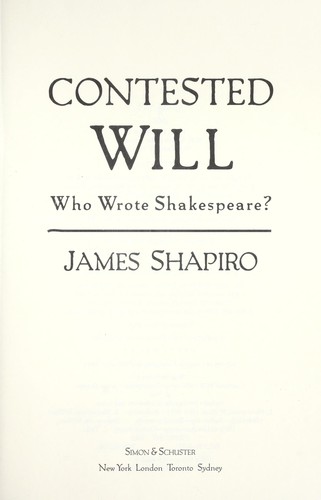Orlion reviewed Contested Will by James S. Shapiro
Review of 'Contested Will' on 'Goodreads'
4 stars
Despite what the title may have you believe, this book is not about weighing the merits of various authorship hypothesis with regards to Shakespearean literature. James Shapiro informs the reader near the beginning that Shakespeare was written by Shakespeare. This book is instead a history of the Shakespearean Authorship Controversy, why and how it developed, the forms it has taken, and why "the establishment" kinda rolls their eyes about it.
The book itself is split into four parts.
In the first part, we get some background history on the development of Shakespearean studies from the eighteenth down to the nineteenth century, what assumptions were made about the Bard, and the desperate struggle to find any documentation that would elucidate the biography of what many considered the greatest English writer to have ever lived. The dearth of such information, and what information being available depicting a "worldly" Shakespeare, led researchers to …
Despite what the title may have you believe, this book is not about weighing the merits of various authorship hypothesis with regards to Shakespearean literature. James Shapiro informs the reader near the beginning that Shakespeare was written by Shakespeare. This book is instead a history of the Shakespearean Authorship Controversy, why and how it developed, the forms it has taken, and why "the establishment" kinda rolls their eyes about it.
The book itself is split into four parts.
In the first part, we get some background history on the development of Shakespearean studies from the eighteenth down to the nineteenth century, what assumptions were made about the Bard, and the desperate struggle to find any documentation that would elucidate the biography of what many considered the greatest English writer to have ever lived. The dearth of such information, and what information being available depicting a "worldly" Shakespeare, led researchers to search William's work for clues into his life. This assumption, that the plays and poetry of Shakespeare contain autobiographical information, is what mostly drives the Authorship Controversy, according to Shapiro.
The second and third parts take a look at the development, rise, and fall of two of the most famous "candidates" for writing Shakespeare: Francis Bacon and Edward de Vere, the Earl of Oxford. These are representative of two main views on the author of Shakespeare: that he hid meaning in ciphers in his plays (Bacon) or that Shakespeare works are veiled satire attacking the establishment and meant to overthrow the tyranny of democracy (Oxford). In both cases, speculative evidence in support of these cases were sought in how closely events in the plays and Sonnets corresponded with the lives of the supposed "true" authors.
In the fourth part, Shapiro makes his case for the Stratfordian authorship. This, like the rest of the book, is well structured and interesting, but seems to be a bit short. It is convincing, but I want more!
Shapiro's book pulls the curtain from the Authorship Question and shows how unfounded assumptions, romanticism, and lack of imagination has led and continues to lead many to false conclusions on the authorship of the works of Shakespeare. He also demonstrates that even in smelly old academia, there is a dynamic progress in place as new research from different fields helps elucidate what culture was like in England during the time of Shakespeare and in particular the practices of the playwrights.

